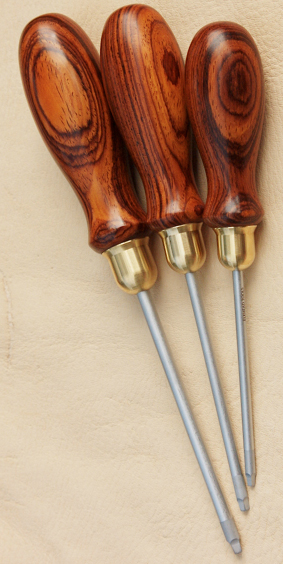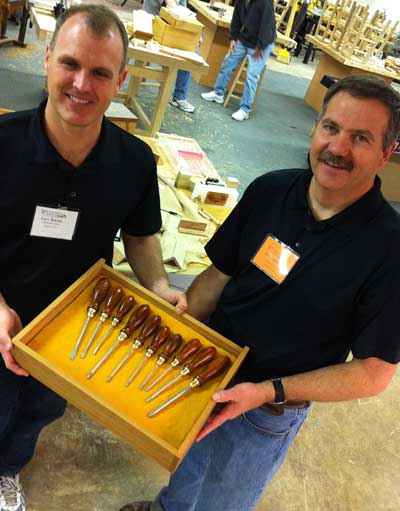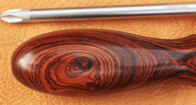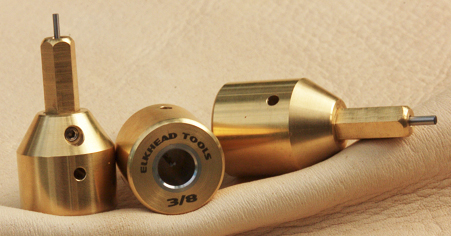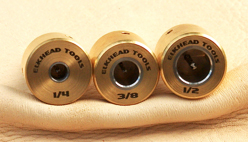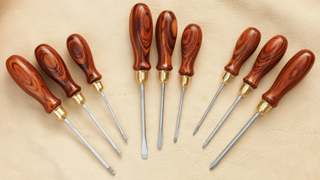
What are you willing to pay for a good screwdriver?
The answer to that question, of course, depends entirely on your expectations. For some, a $6 #2 Phillips from Home Depot will satisfy both the need and the budget. Screwdrivers, to a large extent, have become disposable commodities within our present-day, mass marketed tool culture. Many of us buy them inexpensively to use for our routine tasks and assume that we’ll eventually need to buy another one someday. Screwdrivers get abused, borrowed, lost. They are utilitarian items.
On the other hand, if you’re a collector, a period furniture specialist or a hand tool woodworker who places priority on the look, feel and performance of every tool you purchase, your expectation of a “good” screwdriver might prompt a different answer to the question. A screwdriver may carry the same value as a premium plane, chisel or fret saw in your tool chest. It is an end in itself.
If you’re in the latter group, you’re exactly the customer for whom Elkhead Tools is building premium screwdrivers, one small batch at a time. In fact, the wait for receiving an Elkhead Tool order can be three to eight weeks. But that doesn’t deter customers from waiting a spell for the drivers to arrive. In a market where nothing else compares to a handmade driver, the wait is worth it.
Elkhead Tools, which was only launched a little more than a year ago, is the result of the efforts of two Denver-area orthodontists, Gary Benson and Dave Lindeman, and Chuck Pyne, a self-employed machinist. All three consider themselves to be hobbyist woodworkers who were interested in filling a void in the premium hand tool marketplace for screwdrivers.
“We were in Dave’s shop one night and started kicking around the idea of developing some woodworking tools that could be improved upon,” Gary recalls. “The three of us had noticed that the topic of who makes good quality screwdrivers kept coming up in some of the online hand tool and woodworking forums we follow… Quite honestly, the answer to that question at the time, was no one. We not only wanted to satisfy the niche for other hand tool woodworkers; we also wanted to own better screwdrivers ourselves…we wanted to make screwdrivers that performed as well as they looked, on the level of, say, a Blue Spruce chisel or a Lie-Nielsen plane.”
So, in their spare time, the three started to develop screwdrivers with Old World character, made of the highest quality and embodying a great aesthetic: in other words, heirloom tools. Their aspirations led them to a final design of hand-turned cocobolo handles, solid-brass ferrules and hardened tool-steel shanks. One look at these screwdrivers is all it takes to realize how far they separate themselves from the rest of the pack. These are definitely not your plastic-handled, “big-box” specials.
Gary explained that there have been a number of challenges associated with developing what he considers to be the “rebirth” of heirloom drivers. The first was to overcome certain limitations of traditional wooden-handle screwdrivers — they needed to improve what actually led to the development of plastic-handled screwdrivers in the first place.
“After trying numerous iterations, it didn’t take us long to figure out that there’s really no good way to affix a round, hardened-steel shaft into a wooden handle. Old screwdriver designs relied on stamped wings on the shaft, but those needed to be driven into the handle. Eventually, they would come loose. That’s why plastic handles became the standard. We wanted to use cocobolo for our handles which, although very hard, is also brittle. It wouldn’t accept driving the shank into the handle by force. We tried epoxies, set screws and various pinning methods only to finally conclude that the real solution was to develop a better ferrule to accomplish the handle/shaft connection.”
That challenge led to Elkhead’s solid-brass ferrule, which is joined to the steel shank with industrial retaining compound. Gary says the adhesive, used in industry to set keyways on motor shafts, makes it all but impossible to separate the ferrule from the shank without destroying the brass. They consider it a permanent bond.
The ferrule, which Chuck mills on his CNC equipment, is machined with a square cross-section that fits into the wooden handle. The square interface resists the rotational forces of twisting the screwdriver during use, and it creates a “slip fit” for the cocobolo. Epoxy or CA glue is all that’s required to bond the handle to the ferrule. Gary adds that Elkhead’s hefty ferrule design also contributes to the driver’s overall feel and balance. Much of the interior of the handle is brass, and that added weight, according to Benson, helps to set an Elkhead screwdriver apart from a mass-produced driver. It’s got the right ergonomics.
While the company will make driver handles from nearly any species of wood a customer requests, Gary says cocobolo is the favored choice of the three owners. “Its range of hues and colors make it the best-looking wood around. It’s also hard, durable and maintains the classic look and feel of a lot of the old coveted rosewood handles on other hand tools.” Gary turns each handle on a conventional lathe, after cutting the square hollow for the ferrule with a mortising machine. Dave carries out the final sanding, finishing and assembly of each screwdriver.
Even though the initial product design took some trial and error, those challenges were fairly easy to resolve for the three inventors. The single biggest frustration these days, Benson says, is finding reliable sources for materials, given the modest volumes and level of quality Elkhead requires. “If you want to order 100,000 pieces of a particular part, it’s easier to get that sourced than if you only need 10. For the tool steel, brass and handle stock we need, it’s very time-consuming work to find the right suppliers,” Gary comments. “It’s amazing how many people I’ve talked with and how much time I’ve spent on the phone finding the right sources.”
For example, the screwdriver shanks are currently supplied by a German company. Benson believes the quality of the steel and the precision milling of the tips make these shafts the best-fitting, most reliable and accurate screwdriver shanks on the market. But finding them required a global search that led him to China, Germany and elsewhere.
A second challenge circles back to the original question I posed: the cost/value proposition. Benson believes there will probably always be “the uphill battle” of bucking the $20-per-set screwdriver mindset that’s prevalent for this type of tool. In contrast, Elkhead screwdrivers, which are made in three sizes of Phillips, flat blade and Robertson tip styles, sell for around $75 apiece. Sets range in price from $225 for three drivers to $675 for nine. But the challenge of selling premium hand tools for higher prices in a mass-produced tool market goes with the territory. Those who already embrace the philosophy of handmade hand tools, on the other hand, usually don’t need to be convinced of the value equation. In fact, Gary says the easiest “sells” are to other toolmakers, which come as welcomed affirmations to the new company. “Dave Jeske (owner of Blue Spruce Toolworks) once told me, ‘I’d much rather buy a set of screwdrivers from you than figure out how to make them myself.’ And here’s a guy who earns his living making tools!”
Other accolades come from collectors and professional woodworkers such as Canadian woodworking instructor Duncan Robertson. Gary says Robertson, “who owns one of every Lie-Nielsen tool ever made,” once ordered a set of four Elkhead screwdrivers with square-drive tips. “When I delivered his order to him, Duncan, who French-fits every tool into his tool cabinet, already had a drawer custom-fitted and waiting for those drivers to arrive.”
Benson says master woodworker Frank Klausz is partial to Elkhead flatblades. He owns a set of three.
So far, Gary, Dave and Chuck are pleased with the success of their drivers and the growing visibility of Elkhead in the hand tool marketplace. Gary and Dave travel to several shows per year, but most marketing happens by word-of-mouth or through the company’s website. Numbers of sales are “still in the hundreds,” Benson says, “and we’ll be adding a zero soon.” That seems to suit the owners just fine. The three are committed to “slow growth” so they can continue to be responsive to the needs of their customers and develop future products that really fit a discriminating hand tool clientele. The product line already extends beyond screwdrivers. Elkhead also offers precision brass dowel center drills for making handmade wooden dowel hinges. The drills ensure perfectly centered holes for the hinge pin. Soon, the company will offer a table saw jig that will allow woodworkers to mill dowels from any wood species, again to facilitate wooden dowel hinge making, which is one of Benson’s passions. Plans are also in the works to begin fabricating custom cocobolo handles for fret saws, and Elkhead is considering making brass and cocobolo levels, too.
“We’re not a mass production company, and we never will be… Ours is a very personal, hands-on approach to toolmaking. As hand tool woodworkers, we appreciate the connections we have to other toolmakers whose tools we also use in our own work. I think there’s a real yearning among hand tool woodworkers for that personal connection to the toolmaker. That’s what we want to embrace.”
